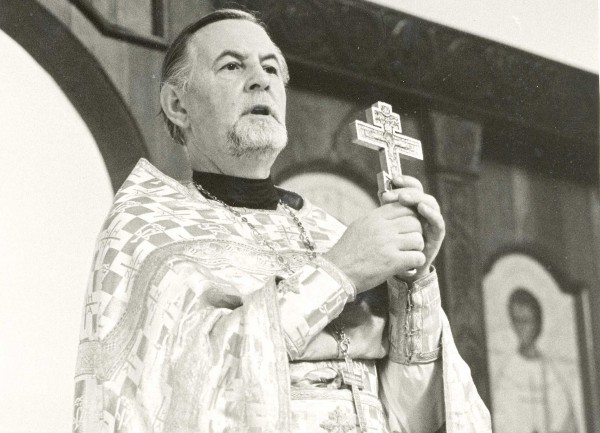Indeed “if Christ is not risen, then your faith is in vain.” These are the words of the Apostle Paul, and they remain fundamental for Christianity to this day.
“He suffered and was buried. And He rose again…” After the Cross, after the descent into death there is the Resurrection from the dead — that principal, fundamental and decisive confirmation of the Symbol of Faith, a confirmation from the very heart of Christianity. Indeed “if Christ is not risen, then your faith is in vain.” These are the words of the Apostle Paul, and they remain fundamental for Christianity to this day. Christianity is a belief, first of all and above all, in the fact that Christ did not remain in the grave, that life shone forth from death, and that in Christ’s Resurrection from the dead, the absolute, all-encompassing law of dying and death, which tolerated no exceptions, was somehow blown apart and overcome from within.
The Resurrection of Christ comprises, I repeat, the very heart of the Christian faith and Christian Good News. And yet, however strange it may sound, in the everyday life of Christianity and Christians in our time there is little room for this faith. It is as though obscured, and the contemporary Christian, without being cognizant of it, does not reject it, but somehow skirts about it, and does not live the faith as did the first Christians. If he attends church, he of course hears in the Christian service the ever resounding joyous confirmations: “trampling down death by death,” “death is swallowed up by victory,” “life reigns,” and “not one dead remains in the grave.” But ask him what he really thinks about death, and often (too often alas) you will hear some sort of rambling affirmation of the immortality of the soul and its life in some sort of world beyond the grave, a belief that existed even before Christianity. And that would be in the best of circumstances. In the worst, one would be met simply by perplexity and ignorance, “You know, I have never really thought about it.”
Meanwhile it is absolutely necessary to think about it, because it is with faith or unbelief, not simply in the “immortality of the soul,” but precisely in the Resurrection of Christ and in our “universal resurrection” at the end of time that all of Christianity “stands or falls,” as they say. If Christ did not rise, then the Gospel is the most horrible fraud of all. But if Christ did rise, then not only do all our pre-Christian representations and beliefs in the “immortality of the soul” change radically, but they simply fall away. And then the entire question of death presents itself in a totally different light. And here is the crux of the matter, that the Resurrection above all assumes an attitude toward death and an concept of death that is most profoundly different from its usual religious representations; and in a certain sense this concept is the opposite of those representations.
It must be frankly stated that the classical belief in the immortality of the soul excludes faith in the resurrection, because the resurrection (and this is the root of the matter) includes in itself not only the soul, but also the body. Simply reading the Gospel leaves no doubt about it. When they saw the risen Christ, the Apostles, as the Gospel says, thought that they were seeing a ghost or a vision. The first task of the risen Christ was to allow them to sense the reality of His body. He takes food and eats in front of them. He commands the doubting Thomas to touch His body, to be convinced of the Resurrection through his fingers. And when the Apostles came to believe, it is precisely the proclamation of the Resurrection, its reality, its “bodiliness” that becomes the chief content, power and joy of their preaching, and the main sacrament of the Church becomes the Communion of bread and wine as the Body and Blood of the risen Christ. And in this act, says the Apostle Paul, “proclaiming the death of the Lord, they confess His Resurrection.”
Those who turn to Christianity turn not to ideas or principles, but they accept this belief in the Resurrection, this experience, this knowledge of the risen Teacher. They accept faith in the universal resurrection, which means the overcoming, the destruction, the annihilation of death as the ultimate goal of the world. “The last enemy to be destroyed is death!” exclaims the Apostle Paul in a sort of spiritual ecstasy. And on every Pascha night we proclaim, “O Death, where is thy sting? O Hell, where is thy victory? Christ is risen, and not one dead remains in the grave. Christ is risen, and life reigns!” In this way the acceptance or non-acceptance of Christ and Christianity is essentially the acceptance or non-acceptance of belief in His Resurrection, and in the language of religious representations that means belief in the union in Him of body and soul, of which the dissolution and ruination is death.
We are not speaking here about those who reject the Resurrection of Christ because they reject the very existence of God, i.e. convinced (or think that they are convinced) atheists. The discussion concerns a quite different area. Of much greater importance is that strange “obscurity” of faith in the Resurrection, which I just mentioned, among those very believers, those very Christians who connect in a peculiar way the celebration of Pascha with the actual, perhaps often subconscious, rejection of the Resurrection of Christ. There has occurred in historical Christianity a sort of return to the pre-Christian concept of death, which consists of, first of all, a recognition of death as a “law of nature,” i.e. a phenomenon inherent in nature itself, with which, for this reason and no matter how frightening death might be, one must “come to terms,” which one must accept. Indeed, all non-Christian, all natural religions, all philosophies are in essence occupied with our “coming to terms” with death and attempt to demonstrate for us the source of immortal life, of the immortal soul in some sort of alien world beyond the grave. Plato, for example, and countless followers after him teach that death is a liberation from the body which the soul desires; and in this circumstance faith in the resurrection of the body not only becomes unnecessary, but also incomprehensible, even false and untrue. In order to perceive the entire sense of Christian belief in the Resurrection, we must begin not from that belief itself, but from the Christian concept of the body and death, for here lies the root of the misunderstanding even within Christianity.
Religious consciousness assumes that the Resurrection of Christ is first of all a miracle, which of course it is. But for the average religious consciousness this miracle is even greater: the miracle of all miracles remains “unique” so to speak, pertaining to Christ. And since we acknowledge that Christ is God, this miracle ceases to be a miracle in a certain sense. God is almighty, God is God, God can do anything! Whatever the death of Christ signifies, His divine power and might did not allow Him to remain in the grave. Yet the fact of the matter is that all this comprises only half of the age-old Christian interpretation of the Resurrection of Christ. The joy of early Christianity, which still lives in the Church, in her services, in her hymns and prayers, and especially in the incomparable feast of Pascha, does not separate the Resurrection of Christ from the “universal resurrection,” which originates and begins in the Resurrection of Christ.
Celebrating one week before Pascha Christ’s raising of His friend Lazarus, the Church solemnly and joyfully confirms that this miracle is a “confirmation of the universal resurrection.” But in the minds of the faithful these two inseparable halves of the faith — faith in the Resurrection of Christ and faith in the “universal resurrection” initiated by Him — have somehow become disconnected. What remains intact is the belief in the rising of Christ from the dead, His Resurrection in the body, which He invites the doubting Thomas to touch: “Reach hither thy finger, and thrust it into My wounds: and be not faithless, but believing.”
Now as for our mortal and final destiny and fate after death, which we have begun to call the world beyond the grave, this destiny and fate has gradually ceased to be interpreted in the light of the Resurrection of Christ and its relation to it. As far as Christ is concerned we confirm that He rose from the dead, but as far as we ourselves are concerned we say that we believe in the immortality of the soul, in which the Greeks and Jews believed ages before Christ, in which to this day all religions believe without exception, and for which belief the Resurrection of Christ (however strange this may sound) is even unnecessary.
What is the reason behind this odd bifurcation? The reason lies in our concept of death, or better in a different concept of death as the separation of the soul from the body. All pre-Christian and extra-Christian “religiosity” teaches that this separation of the soul from the body should be regarded as not only “natural” but also positive, that in this should be seen a liberation of the soul from the body, which prevents the soul from being spiritual, heavenly, pure and blessed. Since in human experience evil, disease, suffering and the passions arise from the body, the goal and meaning of religion and the religious life become naturally the liberation of the soul from this bodily “prison,” a liberation precisely in death which allows it to attain its fullness. But it must be most strongly emphasized that this concept of death is not Christian, and furthermore it is incompatible with Christianity, manifestly contradictory. Christianity proclaims, confirms and teaches, that this separation of the soul from the body, which we call death, is evil. It is not part of God’s creation. It is that which entered the world, making it subject to itself, but opposed to God and violating His design, His desire for the world, for mankind and for life. It is that which Christ came to destroy.
But again, in order not so much to understand, but rather to sense, to feel this Christian interpretation of death, we must begin by saying at least a few words about this design of God’s, as much as has been disclosed to us in the Holy Scriptures and revealed to its fullness in Christ, in His teaching, in his death and in His Resurrection.
This design may be simply and concisely outlined thus: God created man with a body and soul, i.e. at once both spiritual and material, and it is precisely this union of spirit, soul and body that is called man in the Bible and in the Gospel. Man, as created by God, is an animate body and an incarnate spirit, and for that reason any separation of them, and not only the final separation, in death, but even before death, any violation of that union is evil. It is a spiritual catastrophe. From this we receive our belief in the salvation of the world through the incarnate God, i.e. again, above all, our belief in His acceptance of flesh and body, not “body-like,” but a body in the fullest sense of the word: a body that needs food, that tires and that suffers. Thus that which in the Scriptures is called life, that life, which above all consists of the human body animated by the spirit and of the spirit made flesh, comes to an end — at death — in the separation of soul and body. No, man does not disappear in death, for creation may not destroy that which God has called from nothingness into being. But man is plunged into death, into the darkness of lifelessness and debility. He, as the Apostle Paul says, is given over to destruction and ruin.
Here, I would once more like to repeat and emphasize that God did not create the world for this separation, dying, ruin and corruption. And for this reason the Christian Gospel proclaims that “the last enemy to be destroyed is death.” The Resurrection is the recreation of the world in its original beauty and totality. It is the complete spiritualization of matter and the complete incarnation of the spirit in God’s creation. The world has been given to man as his life, and for this reason, according to our Christian Orthodox teaching, God will not annihilate it but will transfigure it into “a new heaven and a new earth,” into man’s spiritual body, into the temple of God’s presence and God’s glory in creation.
“The last enemy to be destroyed is death…” And that destruction, that extermination of death began when the Son of God Himself in His immortal love for us voluntarily descended into death and its darkness, filling its despair and horror with His light and love. And this is why we sing on Pascha not only “Christ is risen from the dead,” but also “trampling down death by death…”
He alone arose from the dead, but He has destroyed our death, destroying its dominion, its despair, its finality. Christ does not promise us Nirvana or some sort of misty life beyond the grave, but the resurrection of life, a new heaven and a new earth, the joy of the universal resurrection. “The dead shall arise, and those in the tombs will sing for joy…” Christ in risen, and life abides, life lives… That is the meaning; that is the unending joy of this truly central and fundamental confirmation of the Symbol of Faith: “And the third day, He rose again according to the Scriptures.” According to the Scriptures, i.e. in accordance with that knowledge of life, with that design for the world and humanity, for the soul and body, for the spirit and matter, for life and death, which has been revealed to us in the Holy Scriptures. This is the entire faith, the entire love, and the entire hope of Christianity. And this is why the Apostle Paul says, “If Christ is not risen, then your faith is in vain.”
Protopresbyter Alexander Schmemann
Russkaya mysl’, Nos. 3299, 3300, March 13, 20, 1980.
Translated from Russian by Robert A. Parent




















